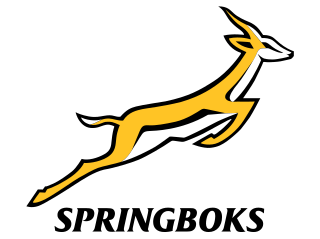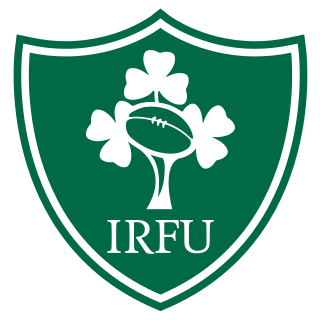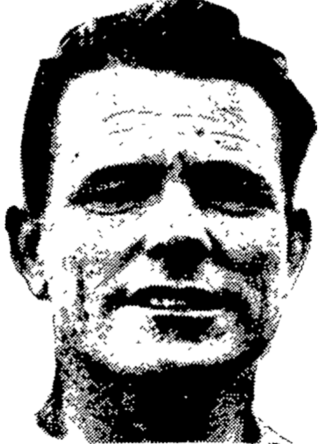Related Research Articles

The New Zealand national rugby union team, commonly known as the All Blacks, represents New Zealand in men's international rugby union, which is considered the country's national sport. Famed for their international success, the All Blacks have often been regarded as one of the most successful sports teams in history.
David Watkins was a Welsh dual-code rugby international, having played both rugby union and rugby league football for both codes' national teams between 1963 and 1979. He captained the British and Irish Lions rugby union side, and made six appearances for the Great Britain rugby league team. With the Wales national rugby league team he played in every match of the 1975 World Cup, and with English club Salford he played more than 400 games over 12 seasons.

Barry John was a Welsh rugby union fly-half who played in the 1960s and early 1970s during the amateur era of the sport. John began his rugby career as a schoolboy playing for his local team Cefneithin RFC before switching to the first-class west Wales team Llanelli RFC in 1964. Whilst at Llanelli, John was selected for the Wales national team—as a replacement for David Watkins—to face a touring Australian team.

The South Africa national rugby union team, commonly known as the Springboks, is the country's national team governed by the South African Rugby Union. The Springboks play in green and gold jerseys with white shorts, and their emblem is the Springbok, a native antelope and the national animal of South Africa. The team has represented South African Rugby Union in international rugby union since 30 July 1891, when they played their first test match against a British Isles touring team. Currently, the Springboks are the reigning World Champions, having won the World Cup a record four times. South Africa are the only team to have won half of the Rugby World Cups they have participated in, and are also the second nation to win the World Cup consecutively.

The Australia men's national rugby union team, nicknamed the Wallabies, is the representative men's national team in the sport of rugby union for the nation of Australia. The team first played at Sydney in 1899, winning their first test match against the touring British Isles team.

William John Heaton Greenwood, MBE is an English former rugby union player who played for Leicester Tigers and Harlequins and was a member of England's 2003 World Cup-winning team and the 1997 British & Irish Lions. He played in the centre, mainly as an inside centre.

The Wales national rugby union team represents Wales in men's international rugby union. Its governing body, the Welsh Rugby Union (WRU), was established in 1881, the same year that Wales played their first international against England. The team plays its home matches at the Millennium Stadium in Cardiff, which replaced Cardiff Arms Park as the national stadium of Wales in 1999.

The Australian national rugby league team, the Kangaroos, have represented Australia in senior men's rugby league football competitions since the establishment of the game in Australia in 1908. Administered by the Australian Rugby League Commission, the Kangaroos are ranked first in the IRL Men's World Rankings. The team is the most successful in Rugby League World Cup history, having won the competition 12 times, and contested 15 of the 16 finals, only failing to reach the final in the 1954 inaugural tournament. Only five nations have beaten Australia in test matches, and Australia has an overall win percentage of 69%.

The Ireland national rugby union team is the men's representative national team for the island of Ireland in rugby union. The team represents both the Republic of Ireland and Northern Ireland. Ireland competes in the annual Six Nations Championship and in the Rugby World Cup. Ireland is one of the four unions that make up the British & Irish Lions – players eligible to play for Ireland are also eligible for the Lions.
John Atkinson was an English rugby union and World Cup-winning professional rugby league footballer. He played in the 1960s, 1970s and 1980s, and was a coach in the 1980s.

Sidney Milton Going was a New Zealand rugby union footballer. Dubbed Super Sid by his fans, he played 86 matches, including 29 tests, for the All Blacks between 1967 and 1977. He represented North Auckland domestically.
Robert Fulton, also nicknamed "Bozo", was an Australian international rugby league footballer, coach and later commentator. Fulton played, coached, selected for and has commentated on the game with great success at the highest levels and has been named amongst Australia's greatest rugby league players of the 20th century. As a player Fulton won three premierships with the Manly-Warringah Sea Eagles in the 1970s, the last as captain. He represented the Australian national side on thirty-five occasions, seven times as captain. He had a long coaching career at the first grade level, taking Manly to premiership victory in 1987 and 1996. He coached the Australian national team in thirty-nine Tests. He was a New South Wales State selector and a national selector. He was a radio commentator with 2GB at the time of his death in 2021, aged 73. In 1981, he was selected as one of the initial four post-war "Immortals" of the Australian game and, in 2008, he was named in Australia's team of the century.
John Brass is an Australian former rugby union and rugby league footballer – a dual-code international. He made twelve international representative rugby union appearances with the Wallabies from 1966 to 1968 and six representative rugby league appearances for the Kangaroos in 1970 and 1975, as national captain on one occasion.
Joseph Paul Lydon is an English former professional rugby league footballer and rugby union coach. He played during the 1980s and 1990s as a fullback, wing, centre, or stand-off for Widnes, Wigan and Eastern Suburbs. He also represented Lancashire, and won 30 caps for Great Britain.
This first tour undertaken by England to South Africa was organised with a demanding schedule, although with only one Test Match. Within two weeks and three days, seven matches were to be played, the first four at sea level, and the final three, including the Test Match, at the altitude in the highveld with only two days to acclimatise before a demanding fixture against Northern Transvaal. From the outset, under captain John Pullin and the management of Alec Lewis and John Elders, there was a buoyant and optimistic spirit in the squad, as if they were determined to erase the memories of the last few seasons of undistinguished English performances.
The rivalry between the England and Australia national rugby union teams started on 9 January 1909 at Blackheath's Rectory Field in England, during the 1908–09 Australia rugby union tour of Britain, dubbed the 1st Wallabies. The Wallabies won the match 9–3. The two nations next met in 1928, at Twickenham, during the 1927–28 Waratahs tour of the British Isles, France and Canada and England won 18–11. After the 1939–40 Australia rugby union tour of Britain and Ireland was cancelled due to the outbreak of World War II, twenty years passed before England and Australia next met, again at Twickenham, with Australia winning the 1948 test 11–0. It would then be another decade until the two nations played another test against one another. In 1958, they met again at Twickenham, and England won 9–6.
Keith John Fielding is an English dual-code international rugby union, and professional rugby league footballer who played in the 1960s, 1970s and 1980s as a winger. He played representative level rugby union for England, and at club level for Moseley Rugby Football Club before switching to rugby league in 1973, and went on to play representative level rugby league for Great Britain and England, and at club level for Salford.

George Philip North is a professional rugby union player who plays as a centre for Pro D2 club Provence Rugby. Born in England, he represents Wales at international level after qualifying on ancestry grounds.

Alphonsus "Fonse" John Carroll was a New Zealand dual-code international rugby union and rugby league footballer who played in the 1920s, who represented New Zealand in both codes. He played at both Prop and Hooker.
Herbert Laxon was an English rugby union halfback who played club rugby for Cambridge University winning sporting Blues in 1903 and 1904. Although never capped internationally for England, in 1908 Laxon was selected to join Arthur Harding's Anglo-Welsh tour of New Zealand and Australia playing in one Test match against New Zealand.
References
- ↑ "England bring in John Barton for Pallant". Liverpool Daily Post . 10 April 1967.
- ↑ "John Barton, 1943 - 2021". www.englandrugby.com. 6 February 2021.
- ↑ "Utility man Barton tours with England". The Birmingham Post . 28 March 1972.
- ↑ "No backward steps from these two rugby greats of the past". The Rugby Paper. 17 January 2021.